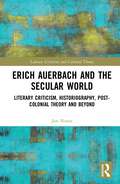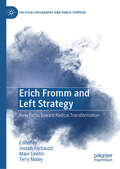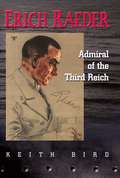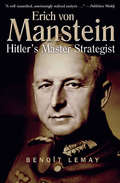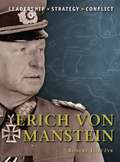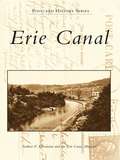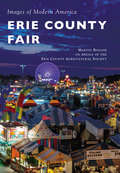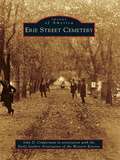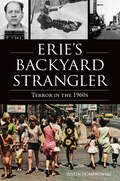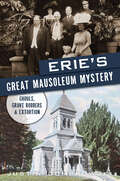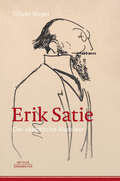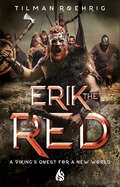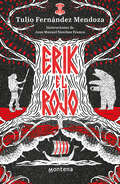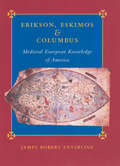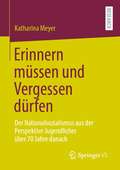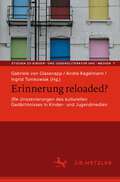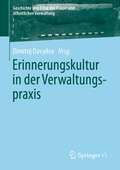- Table View
- List View
Erich Auerbach and the Secular World: Literary Criticism, Historiography, Post-Colonial Theory and Beyond (Literary Criticism and Cultural Theory)
by Jon NixonAuerbach was one of the foremost literary critics of the 20th century whose work has relevance within the fields of literary criticism, historiography and postcolonial theory. The opening chapter of this book explains how he understood the task of interpretation and his role as an interpreter. The following chapter outlines the important phases in his life with reference to the writers and thinkers who influenced him in his thinking and practice. The central chapters of the book focus on specific themes in his work: the historical grounding of the ‘figural’ imagination; the relation between the secular and the sacred; the emergence of tragic realism; and the notion of ‘inner history’ as a defining feature of early 20th-cenntury modernism. The final two chapters focus on broader issues relating to the development of Auerbach’s understanding of the development of an educated readership within Europe and of his concerns regarding the emergence of what he terms ‘a world literature’.
Erich Fromm and Left Strategy: New Paths Toward Radical Transformation (Political Philosophy and Public Purpose)
by Terry Maley Joseph Fantauzzi Maor LevitinThis book considers the work of Erich Fromm as it can be applied to radical Left political strategy. It aims primarily to demonstrate the relevance of his ideas to contemporary radical Left strategy and to contribute to the revitalization of critical social theory and its relationship to radical praxis. Specifically, the case is made throughout this volume that Fromm’s humanist socialism offers a unique set of critical tools for impugning entrenched assumptions and ossified debates within the contemporary radical Left about what struggles against capitalist exploitation and myriad interconnected social oppressions can and should look like. Four vantage points are identified and explored to this end. The first focuses on the question of what Fromm’s theoretical contributions can teach us about what radical activism and resistance ought to look like across multiple terrains of struggle. The second asks what Fromm’s insights regarding social character can teach us about the forces that stifle productiveness and reproduce domination. In a more utopian vein, it asks what society might look like once domination has been eliminated. The third places Fromm in dialogue with diverse voices on the Left, including prominent psychoanalysts and social and political theorists, with an eye toward lingering tensions and disagreements about radical social change. The fourth asks why the Right has gained ground politically in recent years and what can be done to contain it, and offers psychoanalytically inflected reflections on the pernicious effects of group narcissism on individuals’ political agency.
Erich Raeder
by Keith BirdFrom 1928 to 1943, Erich Raeder led the German navy during the last turbulent years of the Weimar Republic, the rise of Hitler, and through World War II, yet until now there has not been a full-length biography written about him. This study draws on archival resources and the rich scholarship of German naval history over the past five decades to review the evolution of Raeder's concept of naval strategy and his attempts to achieve the political and military means necessary to attain the navy's global naval ambitions. While previous histories have viewed Raeder as a product of the Wilhelmian era and heir to Admiral von Tirpitz's sea power ideology, this work clearly demonstrates the navy's affinity with Hitler's fascism. Author Keith Bird refutes Raeder's own argument that his navy was non-political and independent and shows him to be a political activist and the architect of German naval policy. For the first time, Raeder's strict leadership of the navy after 1928 and his relationship to Hitler and the National Socialist state is placed in the context of Raeder's formative years as an Imperial naval officer, his First World War combat experience, and his critical role in the survival and development of the post-war Reichsmarine. The author traces the impact of Hitler's influence on both the pace and nature of naval rearmament 1933-1939 and the conduct of the Kriegsmarine in war as well as Raeder's furtive attempts to influence Germany's strategic thinking in favor of a maritime strategy. Blinded by his need to justify the navy's existence and achieve his vision of world power, Raeder was ultimately defeated by the contradictions in his own policies as well as Hitler's and the realities of Germany's resources and military necessities.
Erich von Manstein: Hitler's Master Strategist
by Benoit LemayA Selection of the Military Book Club: An “informative and objective” biography of a genius commander and a study of his loyalty to the Nazi cause (Library Journal).To many close students of World War II, Erich von Manstein is considered the greatest commander of the war, if not the entire twentieth century. He devised the plan that conquered France in 1940, and led an infantry corps in that campaign. At the head of a panzer corps he reached the gates of Leningrad in 1941, then took command of 11th Army and conquered Sevastopol and the Crimea. After destroying another Soviet army in the north, he was given command of the ad hoc Army Group Don to retrieve the German calamity at Stalingrad, whereupon he launched a counteroffensive that, against all odds, restored the German front. Afterward he commanded Army Group South, nearly crushing the Soviets at Kursk, and then skillfully resisted their relentless attacks as he traded territory for coherence in the East.Though an undoubtedly brilliant military leader—whose achievements, considering the forces at his disposal, rivaled of Patton, Rommel, MacArthur, and Montgomery—surprisingly little is known about Manstein himself, save for his own memoir and the accolades of his contemporaries. In this book we finally have a full portrait of the man, including his campaigns, and an analysis of what precisely kept a genius like Manstein harnessed to such a dark cause.A great military figure, but a man who lacked a sharp political sense, Manstein was very much representative of the Germano-Prussian military caste of his time. Though Hitler was uneasy about the influence he’d gained throughout the German Army, Manstein ultimately declined to join any clandestine plots against his Führer, believing they would simply cause chaos, the one thing he abhorred. Though he constantly opposed Hitler on operational details, he considered it a point of loyalty to simply stand with the German state, in whatever form. Though not bereft of personal opinions, his primary allegiances were, first, to Deutschland, and second, to the soldiers under his command, who’d been committed against an enemy many times their strength.It is thus through Manstein that the attitudes of other high-ranking officers who fought during the Second World War, particularly on the Eastern Front, can be illuminated. This book is “a well-researched, convincingly reasoned analysis of a general widely considered one of WWII’s great commanders” (Publishers Weekly).Includes photographs
Erich von Manstein: Leadership, Strategy, Conflict
by Robert ForczykErich von Manstein was one of the most successful German commanders of World War II. An apostle of the German concept of Bewegungskrieg -- manoeuvre warfare -- he was responsible for the operational plan for the German breakthrough in the Ardennes Forest that led to the rapid defeat of France in 1940. He led a panzer corps in the drive to Leningrad in 1941 and an army in the Crimea, culminating in the capture of Sevastopol in 1942. As commander of Heeresgruppe Don, he oversaw the doomed attempt to rescue the German position at Stalingrad, before inflicting a major reverse on Soviet forces in the third battle of Kharkov in March 1943, probably his finest victory. This is a military account of von Manstein's greatest battles, providing an analytical account of his tactics, decisions and character traits that helped him succeed in battle and made him one of the most respected German commanders.
Erie Canal
by Andrew P. Kitzmann Erie Canal MuseumThe Erie Canal was completed in 1825 and became the backbone of an economic and cultural explosion that defined the image of New York. The canal's development spurred successful industry and a booming economy, sparking massive urban growth in an area that was previously virtually unexplored wilderness. People poured west into this new space, drawn by the ability to ship goods along the canal to the Hudson River, New York City, and the world beyond. Erie Canal is a compilation of 200 vintage images from the Erie Canal Museum's documentary collection of New York's canal system. Vintage postcards depict life and industry along the canal, including not only the Erie itself but also the lateral and feeder canals that completed the state-wide system.
Erie County Fair (Images of Modern America)
by Martin Biniasz Erie County Agricultural SocietyFrom its humble, pioneer beginnings to its current incarnation as the largest independent county fair in the United States, the Erie County Fair in Hamburg, New York, is a beloved western New York institution. Annually, over one million people flock to its historic fairgrounds located just south of Buffalo to celebrate agriculture, showcase time-honored traditions, keep the spirit of competition alive, and, most importantly, come together as a community. Through vintage photographs, Erie County Fair presents a visual narrative of the fair's history and stimulates cherished memories rooted in decades of excitement found at this annual summer gathering. The continuity of the American county fair spirit is most evident through these images from the archives of the Erie County Agricultural Society.
Erie Railroad's Newburgh Branch
by Robert MccueFor over 130 years, the Erie Railroad's Newburgh branch was a key factor in the economic and social life of the city of Newburgh, New York, and the towns that had stations along its 19-mile route between Newburgh and the Erie main line. Only five miles of this once vital rail link survive today. Looking at this lightly used rail spur today, the casual passerby would have no hint of the rich history that can be seen for only a moment from the car window. Erie Railroad's Newburgh Branch will take both dedicated and new railfans back to the days when rail travel was every town's modern mode of transport as well as its economic lifeblood. It was a simpler time, before the age of air travel and America's love affair with a new invention called the automobile.
Erie Street Cemetery
by Early Settlers Association of the Western Reserve John D. CimpermanErie Street Cemetery is Cleveland's oldest existing cemetery. Today downtown Cleveland towers over this peaceful plot of land, which has remained essentially unchanged since it was opened as a burial ground in 1826 at the far edge of the town, whose population was only about 800 at the time. Within the cemetery are the graves of soldiers who served in the Indian Wars, the Revolutionary War, the War of 1812, the Civil War, the Mexican War, and the Spanish-American War, and it is the last resting place of many of the city's early leaders and pioneer families.
Erie Trail West: A Dream-quest Adventure
by Janie Lynn PanagopoulosAn eleven-year-old New York farm girl travels with her parents to the Michigan Territory in 1836 by way of the Erie Canal, encountering unknown dangers and incredible hardships.
Erie's Backyard Strangler: Terror in the 1960s (True Crime)
by Justin DombrowskiOn a cold morning in December 1960, sixty-year-old Laura Mutch was found strangled behind a house in downtown Erie. The city was reaching new heights, including a triumphant run for the coveted "All-American City" award, yet the incident created pandemon
Erie’s Great Mausoleum Mystery: Ghouls, Grave Robbers & Extortion (True Crime)
by Justin DombrowskiErie's Shocking Turn of the Century Extortion Scandal On February 8, 1911, the Scott Mausoleum, a symbol of wealth for the Scott and Strong families in Erie, Pennsylvania, was desecrated by unknown vandals, coined by nationwide papers as ghouls. With the inside of the mausoleum heavily damaged - and a body missing - the crime set off shockwaves throughout the country during a time in which grave robbery, extortion and murder reigned supreme. Hundreds of reporters and newspaper correspondents throughout the country and world descend upon the Great Lakes port city. Private Detectives from the Perkins Detective Agency in Pittsburgh took charge of the case, pitted against rival detectives from the famous Burns Detective Agency. The case took a sinister turn when a series of letters were sent to wealthy local philanthropist Charles Hamot Strong, threatening to blow up his mausoleum and murder his granddaughter. Author Justin Dombrowski presents the twists and turns of a historic and shocking crime and coverup in Erie, Pennsylvania.
Erik Satie Three Piece Suite (Semiotext(e) / Native Agents)
by Ian PenmanA masterful study of the elusive French composer, on the centenary of his death.Composer, pianist, and writer Erik Satie was one of the great figures of Belle Époque Paris. Known for his unvarying image of bowler hat, three-piece suit, and umbrella, Satie was a surrealist before surrealism and a conceptual artist before conceptual art. Friend of Cocteau and Debussy, Picabia and Picasso, Satie was always a few steps ahead of his peers at the apex of modernism. There&’s scarcely a turn in postwar music, both classical and popular, that Satie doesn&’t anticipate. Moving from the variety shows of Montmartre&’s Le Chat Noir to suburban Arcueil, from the Parisian demimonde to the artistic avant-garde, cult critic Ian Penman&’s masterful Erik Satie Three Piece Suite is an exhilarating and playful three-part study of this elusive and endlessly fascinating figure, published to mark the centenary of Satie&’s death.
Erik Satie: A Parisian Composer And His World
by Caroline PotterThe music of Erik Satie (1866-1925) appeals to wide audiences and has influenced both experimental artists and pop musicians. Little about Satie was conventional, and he resists classification under easy headings such as "classical music". Instead of pursuing the path of a professional composer, Satie initially earned a living as a café pianist and moved in bohemian circles which prized satire, popular culture and experiment. Small wonder that his music is fundamentally new in conception. It is music which is not always designed to be listened to attentively: music which can be machine-like but is to be played by humans. For Satie, music was part of a wider concept of artistic creation, as evidenced by his collaborations with leading avant-garde artists and in works which cross traditional genre boundaries such as his texted piano pieces. His music was created in some of the most exciting and creatively stimulating environments of the late nineteenth and early twentieth century: Montmartre and Montparnasse. Paris was the artistic centre of Europe, and Satie was a notorious figure whose music and ideas are inextricably linked with the City of Light. This book situates Satie's work within the context and sonic environment of contemporary Paris. It shows that the influence of street music, musicians and poets interested in new technology, contemporary innovations and radical politics are all crucial to an understanding of Satie. Music from the ever-popular Gymnopédies to newly discovered works are discussed, and an online supplement features rare pieces recorded especially for the book. CAROLINE POTTER is Reader in Music at Kingston University London. A graduate in both French and Music, she has published widely on French music since Debussy and was Series Advisor to the Philharmonia Orchestra's Paris 2014-15 season.
Erik Satie: Der skeptische Klassiker
by Oliver VogelErik Satie (1866-1925) gilt allgemein als eine Ikone der Moderne. Nach mehreren Jahrzehnten erscheint nun erstmals wieder eine deutschsprachige Gesamtdarstellung seines Lebens und Schaffens. Der auf dem Montmartre sozialisierte Musikpionier war ein Fragender. In skeptischer Absicht schärfte er seinen Humor, um auch seine Zeitgenossen nach sokratischer Manier zu prüfen. Unbefangen stellte er sich nach Art eines Amateurs immer wieder neuen Voraussetzungen. Von den autoritären Zügen der musikalischen Tradition dagegen nahm er Abstand, ohne doch den Anspruch aufzugeben, gelegentlich – in Resonanz mit den anderen Künsten – klassische Modelle vorzulegen. Vom Symbolismus bis zum Dadaismus wirkte er inmitten der Besten, weswegen diese neue Biographie zugleich auch in die Mitte des Pariser Künstlerkosmos eintaucht. Aus dem reichen Journalismus des 19. und 20. Jahrhunderts fördert Oliver Vogel eine Vielzahl unbekannter Anekdoten zutage und verdichtet die Stimmen derer, die dabei waren, zu einem lebendigen Konzert.
Erik The Red
by Tilman RoehrigLove and destruction, toil and triumph blend in a gripping historical fiction account of the life of Erik the Red, taking him from the Iceland into the great unknown as he searches for his place in the world. Exiled from his homeland of Norway as a boy, Erik Thorvladsson wants nothing more than to honor his father's legacy and to figure out where he belongs in the world. But to claim and cultivate his own homestead is no easy task. Navigating natural disasters, violent clashes, and banishment, he seeks his fortunes in an Iceland on the brink of change. But when a conflict over property erupts into violence, Erik is outlawed from the country for three years and sets off on his greatest challenge of all. Assembling a group of settlers, he and his family sail west into uncertainty, hoping to finally find a green and prosperous land to call their own. "A mysterious death and a fantastical curse add light intrigue while mature sexual situations make this a great crossover novel for adult readers." - Kirkus Reviews
Erik el Godo. El sabio de Cesaracosta (Historia Incógnita)
by Isabel Abenia MarcellánAño 646, Spania: El clan del joven Erik llega a la ciudad visigoda de Cesaracosta, procedentes del norte. El clan del joven Erik viaja desde Escandinavia hasta la ciudad visigoda de Cesaracosta. Tendrán que adaptarse a la cultura y estilo de vida de una Spania crisol de culturas romanas, judías, visigodas y celtíbero prerromanas. A Erik le esperan asombrosas peripecias al lado de la hermosa hechicera Galeswintha. Erik consigue convertirse en un hombre notable gracias a una inteligencia poco corriente y a una peculiar forma de ver la vida, codeándose con los personajes más relevantes de ese periodo histórico mientras vive las más trepidantes aventuras. Erik el Godo reconstruye el siglo VII minuciosamente a través de los personajes más diversos: reyes, obispos nobles, jueces, médicos, braceros, esclavos, comerciantes, configurando un apasionante retrato social de la España visigoda. Isabel Abenia fusiona la ficción literaria con el máximo rigor histórico, uniendo lo novelado y la verdadera Historia de unos siglos tan apasionantes como desconocidos. La autora emplea una perfecta mezcla de lenguaje clásico y contemporáneo para conseguir una trama y una acción absolutamente verosímiles. Erik el Godo es una novela de acontecimientos históricos reales, magia y hechos fantásticos, religiones y mitología junto a grandes dosis de costumbrismo que le atraparán y le sumergirán en la sociedad del siglo VII.
Erik el Rojo: El vikingo que descubrió América
by Tulio Fernández Mendoza"Un libro con un secreto milenario que nos hará cuestionar la historia del encuentro entre dos mundos". Esteban Cruz Niño Esta es la historia del explorador noruego Erik el Rojo, un hombre marcado por la sangre y el exilio, y destinado por los dioses vikingos a empujar las fronteras y las convenciones sociales de su tiempo. Esta es también la historia del sabio Mimir, hermano adoptivo y amigo incondicional de Erik, quien narra sus aventuras y las de sus descendientes, ilustrándolas con antiguos relatos nórdicos. Pero, sobre todo, esta es la historia del primer encuentro con el Nuevo Mundo, que maravilló a los nórdicos quinientos años antes de Cristóbal Colón, un evento conocido por pocos y narrado aquí con el encanto de las viejas sagas "Una lectura original, tan apasionante como divertida, con un novedoso acercamiento a los relatos tradicionales de mitología nórdica". Carolina Andújar
Erika's Story
by Ruth Vander ZeeA woman recalls how she was thrown from a train headed for a Nazi death camp in 1944, raised by someone who risked her own life to save the baby's, and finally found some peace through her own family.
Erikson, Eskimos & Columbus: Medieval European Knowledge of America
by James Robert EnterlineThis revealing analysis of Medieval cartography and native American travel upends conventional narratives about discovering the New World.For generations, American schools have taught children that Christopher Columbus discovered America in 1492. But evidence shows that Leif Erikson set foot on the continent centuries earlier. As debate continues over which explorer deserves the credit, early maps of North America suggest that we may be asking the wrong questions. How did medieval Europeans have such specific geographic knowledge of North America, a land even their most daring adventurers had not yet discovered? In Erikson, Eskimos, and Columbus, James Robert Enterline presents new evidence that traces this knowledge to the cartographic skills of indigenous people of the high Arctic, who, he contends, provided the basis for medieval maps of large parts of North America. Drawing on an exhaustive chronological survey of pre-Columbian maps, including the controversial Yale Vinland Map, this book boldly challenges conventional accounts of Europe’s discovery of the New World.
Erikson, Eskimos, and Columbus: Medieval European Knowledge of America
by James Robert EnterlineHow did medieval Europeans have such specific geographic knowledge of North America, a land even their most daring adventurers had not yet discovered? In Erikson, Eskimos, and Columbus, James Robert Enterline presents new evidence that traces this knowledge to the cartographic skills of indigenous people of the high Arctic, who, he contends, provided the basis for medieval maps of large parts of North America. Drawing on an exhaustive chronological survey of pre-Columbian maps, including the controversial Yale Vinland Map, this book boldly challenges conventional accounts of Europe's discovery of the New World.
Erin's Child (The Feeney Family Sagas)
by Sheelagh KellyA struggling Irish family in nineteenth century England sets its hopes on a new generation in the third volume of this dramatic historical saga.England, 1875. The Feeney family has finally escaped the squalid slums of York. Though they have worked hard to rise up from poverty, they have not left hardship behind. The father Patrick remains a man of simple tastes, increasingly out of touch with his wife Thomasin&’s ambition to expand her business empire across Yorkshire. After losing their son, the Feeneys&’ hopes for the family&’s future now lie with their grandchildren. There is Rosanne, set to follow a rebel lover down a star-crossed road, and Erin&’s daughter Belle, gifted and headstrong but born with a disability. The family has faces many challenges before, but what happens next will test them all.
Erinnern müssen und Vergessen dürfen: Der Nationalsozialismus aus der Perspektive Jugendlicher über 70 Jahre danach
by Katharina MeyerMehr als 70 Jahre nach dem Ende des Nationalsozialismus prägt die wachsende zeitliche Distanz zum historischen Geschehen die Auseinandersetzung mit diesem. Veränderte familiäre Bezüge, der Abschied von Zeitzeug*innen und gegenwärtige gesellschaftliche Diskurse nehmen Einfluss auf die Perspektiven Jugendlicher. Dies wirft eine Vielzahl von Fragen auf: Wie beschäftigen sich junge Menschen in Deutschland mehr als sieben Jahrzehnte nach dem Holocaust mit dem Thema? Welche Relevanz hat der Nationalsozialismus für sie, welche geschichtlichen Vorstellungen von der Zeit haben sie und wie erleben sie den Umgang damit in Deutschland? Die Studie geht diesen Fragen anhand des Gruppendiskussionsverfahrens und der Grounded Theory Methodologie empirisch nach, nimmt Kontinuitäten und Brüche in den Bezügen zum Nationalsozialismus in den Blick und zeigt Zusammenhänge zur Identifikation mit Deutschland auf.
Erinnerung reloaded?: (Re-)Inszenierungen des kulturellen Gedächtnisses in Kinder- und Jugendmedien (Studien zu Kinder- und Jugendliteratur und -medien #7)
by Ingrid Tomkowiak Gabriele Von Glasenapp Andre KagelmannDer Band lotet die Bedingungen des Erinnerns und Erzählens und damit einer Re-Inszenierung der Vergangenheit im Feld der Kinder- und Jugendmedien aus. Besonderes Augenmerk wurde auf das Spannungsfeld von ‚objektiver‘ Geschichtswissenschaft einerseits und Dichtung andererseits gelegt, angesiedelt zwischen den Polen Referenzialität und einem neuen Interesse am vermeintlich Authentischen sowie der Fiktionalisierung von Fakten. Dieser Widerspruch ist von besonderer Bedeutung für die geschichtserzählenden Kinder- und Jugendmedien mit ihrem spezifischen Funktionsrahmen von ästhetischer und pädagogischer Horizontbildung und -erweiterung. Neben den traditionellen kinder- und jugendliterarischen Erinnerungsmedien – erzählende Literatur, historische und zeitgeschichtliche Romane, (autofiktionale) Biographien – sowie Drama und Lyrik werden Bilderbücher, Comics, Filme, Serien und Computerspiele in den Blick genommen.
Erinnerungskultur in der Verwaltungspraxis (Geschichte und Ethik der Polizei und öffentlichen Verwaltung)
by Dimitrij DavydovDie Aufrechterhaltung der Erinnerung an die Opfer von Krieg und Gewaltherrschaft, an Widerstand, Flucht und Vertreibung wird heute überwiegend als eine gesamtgesellschaftliche Aufgabe wahrgenommen und nicht als eine alleinige Prärogative des Staates. Dennoch ist öffentliches Erinnern und Gedenken als Bestandteil des kulturstaatlichen Auftrags von Bund, Ländern und Kommunen anerkannt. Der Umgang des Staates und seiner Institutionen mit (schmerzhafter) Vergangenheit und den Orten, an denen die Erinnerung an diese Vergangenheit „haftet“, ist zwar seit Jahren Gegenstand intensiver Forschung. Die verwaltungsrechtliche und verwaltungshistorische Perspektive ist dabei jedoch deutlich unterrepräsentiert gewesen. Nicht nur Fragen der Aufgabenverteilung zwischen den staatlichen und den zivilgesellschaftlichen Akteuren, sondern auch die Kompetenzen, Organisationsformen und Entscheidungsmaßstäbe der mit Erinnerungsaufgaben befassten Behörden und Einrichtungen sind bislang nur punktuell beleuchtet worden. Sind der Bund und die Länder allein als Förderer oder Koordinatoren für kommunale und zivilgesellschaftliche erinnerungskulturelle Aktivitäten gefragt? Besteht ein Handlungsbedarf für die Schaffung einer zentralen – zumindest einer überörtlichen – erinnerungskulturellen Infrastruktur? Bedürfen Gedenkstätten und andere Erinnerungsorte eines spezifischen ordnungsrechtlichen Schutzes? Wie kann die Sicherstellung des Pietätsschutzes an Orten des Gedenkens verfassungskonform ausgestaltet werden? Erfordert ein angemessener Umgang mit flächenhaften Zeugnissen der deutschen Vergangenheit wie dem Westwall und den Relikten des „Eisernen Vorhangs“ besondere rechtliche Vorkehrungen?Diese Lücke soll der vorliegende Band füllen, der im Rahmen eines von der Hochschule für Polizei und öffentliche Verwaltung des Landes Nordrhein-Westfalen geförderten Projekts entstanden ist. Autor:innen des Bandes sind Jurist:innen und Historiker:innen aus den Bereichen Lehre, Forschung und Verwaltung.
